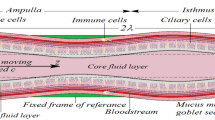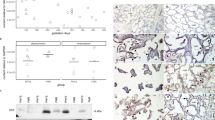Abstract
VERY little is known about the endocrine regulation of amniotic fluid volume and composition1,2. Vizsolyi and Perks2 have described a technique for studying the transfer of fluid across the amniotic membrane of the guinea pig in vitro. They showed that arginine vasotocin and arginine vasopressin (antidiuretic hormone, ADH) could stimulate the movement of fluid from the maternal to the foetal side of the membrane. Because prolactin is found in remarkably high concentrations (up to 10 µg ml−1) in primate amniotic fluid3,4 and affects renal function5–8, we have investigated the effect of prolactin as well as of arginine vasopressin on the guinea pig amniotic membrane. Because cortisol can reverse the usual antidiuretic effect of ADH and because prolactin can restore this effect9, we have also investigated the action of cortisol. We have shown that ADH and prolactin have opposite effects on the amniotic membrane and that, in both cases, their actions can be reversed by cortisol. We suggest that fluid transfer across the amniotic membrane may provide an insight to the functioning of the kidneys, the ciliary body and the choroid plexus.
This is a preview of subscription content, access via your institution
Access options
Subscribe to this journal
Receive 51 print issues and online access
$199.00 per year
only $3.90 per issue
Buy this article
- Purchase on Springer Link
- Instant access to full article PDF
Prices may be subject to local taxes which are calculated during checkout
Similar content being viewed by others
References
Liley, A. W., in Pathophysiology of Gestation, II (edit. by Assali, N. S., and Brinkman, C. R.), 154–182 (Academic, New York and London, 1972).
Vizsolyi, E., and Perks, A. M., Can. J. Zool., 52, 371–386 (1974).
Friesen, H., et al., in Prolactin and Carcinogenesis (edit. by Boyns, A. R., and Griffiths, K.), 64–80 (Alpha Omega Alpha Publishing Co., Cardiff, 1972).
Josimovich, J. B., Weiss, G., and Hutchinson, D. L. Endocrinology, 94, 1364–1371 (1974).
Lockett, M. F., J. Physiol., Lond., 181, 192–199 (1965).
Horrobin, D. F., et al., Lancet, ii, 352–354 (1971).
Horrobin, D. F., Prolactin: Physiology and Clinical Significance (Medical and Technical Publishing, Lancaster, 1973).
Horrobin, D. F., Prolactin 1974. (Medical and Technical Publishing, Lancaster, 1974).
Horrobin, D. F., Manku, M. S., and Robertshaw, D., J. Endocr., 58, 135–136 (1973).
Cope, C. L., Adrenal Steroids and Disease, Second ed. (Pitman Medical, London, 1972).
Niederer, W., Richardson, B. P., and Donatsch, P., Expl Eye Res., 20, 329–340 (1975).
Johnson, D. W., Am. Zool., 13, 799–818 (1973).
Doneen, B. A., and Bern, H. A., J. exp. Zool., 187, 173–179 (1974).
Author information
Authors and Affiliations
Rights and permissions
About this article
Cite this article
MANKU, M., MTABAJI, J. & HORROBIN, D. Effect of cortisol, prolactin and ADH on the amniotic membrane. Nature 258, 78–80 (1975). https://doi.org/10.1038/258078a0
Received:
Accepted:
Issue Date:
DOI: https://doi.org/10.1038/258078a0
Comments
By submitting a comment you agree to abide by our Terms and Community Guidelines. If you find something abusive or that does not comply with our terms or guidelines please flag it as inappropriate.



